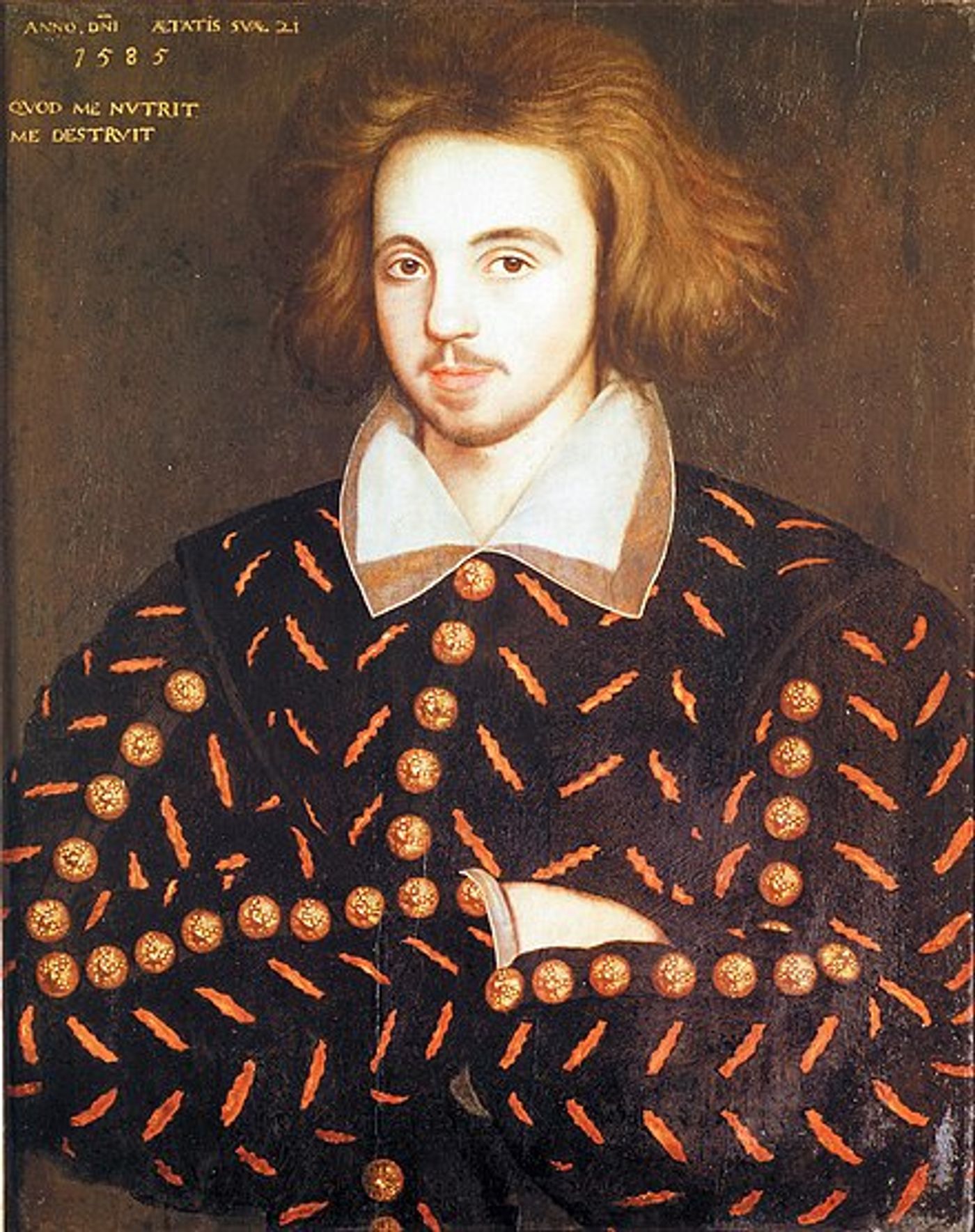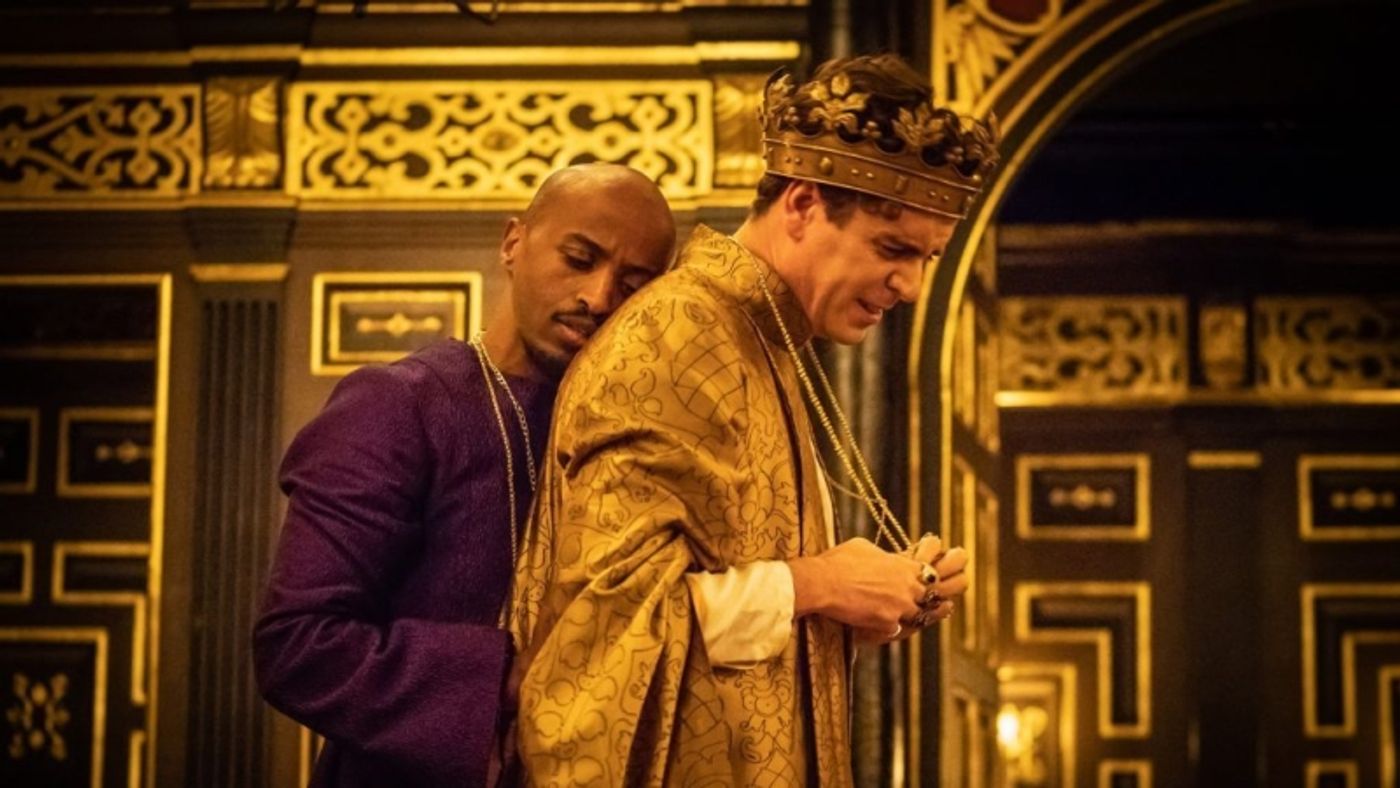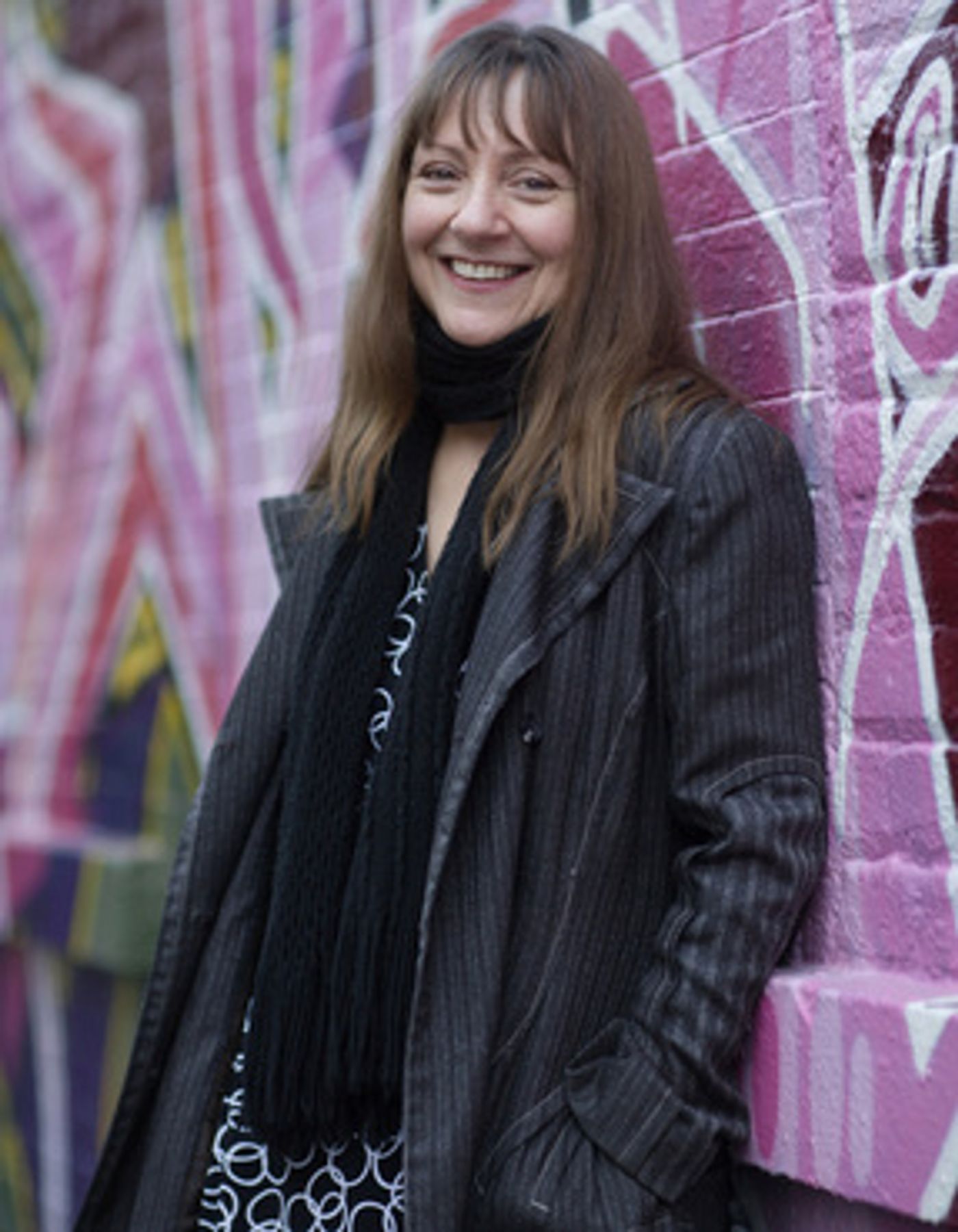Feature: The Gays of History Get Their Due in BORN WITH TEETH at The Alley Theatre
The Alley All-New Play Gives Proper Recognition to an Underpraised Queer Playwright

When Matthew Amendt swaggers onstage as Christopher Marlowe, the rockstar wunderkind of the Elizabethan theatre, he brings with him an entire history of literary, political, and artistic strife. A great mind of virtuosic talent, but one who ultimately ended up in the shadow of his more famous contemporary (the incomparable Will Shakespeare), Marlowe is hardly the household name that Shakespeare is. Still, Liz Duffy Adams's new play Born with Teeth puts them on equal footing and presents us with an opportunity to give recognition to a historical gem of a writer: one whom many historians believe may have actually been homosexual. A radical and a wild man, Marlowe reminds us of all the ways in which history silences those of us who speak out against the restrictive norms of our society; especially those of us who choose to love in ways that society deems incorrect.

Christopher Marlowe
For those who are not familiar with our man in question, Christopher Marlowe was born in February 1564, exactly two months before Shakespeare, in the political hot spot of Canterbury. The son of a poor shoemaker, young Kit proved himself from an early age to be a precocious child. His parents had high hopes that his intellect would allow him to rise higher in life than they did-these hopes were rewarded, when he not only earned a scholarship to study at the King's School, but later to study at Cambridge. He would go on to become one of the most revered playwrights in London during his life, penning many plays which are still performed today. He also lived a tumultuous life, rubbing elbows with many volatile political figures such as Sir Walter Raleigh, Robert Cecil, and Thomas Walsingham, among others. He even made extra money by becoming a spy for Queen Elizabeth I's Secret Service. Even outside of the subversive content of his plays, Kit lived life on the edge.
Now, you may have caught that I said Marlowe may be queer. Worry not - I'm hedging my bets. He almost certainly was. Of course, we cannot know with 100% certainty, and there is certainly a contingent of historians (I like to think of them as heterosexual apologists) who argue that he wasn't. According to them, we're reading too much into things. However, I'll let you have a look at his resume and you tell me if you think the apologists have a case.
The Baines Note
One of the most direct pieces of evidence that Marlowe was homosexual is that more than one of his peers literally said that he was. Marlowe was no stranger to being arrested, but he found himself in very hot water in 1593 when he was accused by Richard Baines of being not only an atheist, but a homosexual as well. In his accusations against Marlowe, Baines repeated what would become one of Marlowe's most famous quotes: "All they that love not tobacco and boys are fools."
He went on to list a number of other things Marlowe had supposedly said, including that Jesus Christ and John the Apostle were lovers. Several of Baines's claims were corroborated by Thomas Kyd, a fellow playwright, and Marlowe's roommate at the time.
Of course, Baines and Kyd were both likely being tortured when they said these things, so perhaps their testimonies are hearsay. The quote above certainly sounds like something Marlowe would say, but we cannot assume with any certainty that he did actually say it. However, if coerced testimony will not suffice, let us turn toward Marlowe's plays for further evidence.
The Plays
While close male friendships and displays of affection were common in Shakespeare and Marlowe's day, Marlowe's plays go above and beyond in their display of same-sex desire. The most famous example is his Edward II, a play about the relationship between King Edward II of England and his favorite, Lord Piers Gaveston of Ireland. Marlowe's play was, up to that point, the first to focus on Edward II, and the play has been cited over and over again in the modern age for its overwhelming homoerotic overtones.
Many historians believe that Edward and Gaveston may have been lovers (that "may" is the same one that I used before-worry not; they were lovers), and Marlowe is not shy about leaning into their love for one another. Basically the entire play is about Edward's cabinet worrying about the relationship and scheming to break them up by having Gaveston banished. When Edward puts up a fight, we get lines like these ones, from Act I, Scene IV:
KING EDWARD: Make several kingdoms of this monarchy,
And share it equally amongst you all,
So I may have some nook or corner left,
To frolic with my dearest Gaveston.
ARCHBISHOP OF CANTERBURY: Nothing shall alter us, we are resolv'd.
LANCASTER: Come, come, subscribe.
YOUNG MORTIMER: Why should you love him whom the world hates so?
KING EDWARD: Because he loves me more than all the world.
Whosoever tries to pass that off as heterosexual is fooling themselves. Not only that, but there is one scene in which one of Edward's men tries to defend the relationship by offering other examples of great men who were simply abnormally close. This list includes Achilles and Patroclus, the most famous boyfriends in Greek mythology. It is almost as if Marlowe is saying "Men have loved men for as long as there have been men to love."

of Edward II; when was the last time you held your best friend like that?
If that is not evidence enough, perhaps we should look at Marlowe's very first play, Dido, Queen of Carthage. Although focusing on the titular character from Virgil's Aenead, Marlowe begins the play with an extended scene of Jupiter (yes, the King of the Gods) desperately trying to seduce a young man named Ganymede. Now, of course it was common knowledge that the Ancient Greeks did get up to such things. The suspicious part is that these two characters never show up again for the rest of the play, and their courtship has absolutely nothing to do with the main plot. So basically, Marlowe's first play begins with a male-on-male seduction scene FOR NO REASON. If one squints, it's almost as if Marlowe is daring the audience to wonder what that scene is doing there.
Or perhaps we should look at his famous poem, Hero and Leander, in which he spends an exorbitant amount of lines gushing over the male protagonist's beauty, including this gem of a line: "In his looks were all that men desired." There's not much heterosexuality in that sentiment.
You get my point. Passionate male friendships may have been more common at the time, but not one other Elizabethan writer produced homoerotic content at the same level as Marlowe.
What Did "Gay" Mean in Renaissance England?
Of course, it's not entirely accurate to describe Marlowe as a gay man, since the concepts of "gay" and "straight" did not actually exist at the time. Certainly there were those who desired members of their own sex, but who someone had sex with was not considered part of one's identity the way it is today. Still, it's not like people didn't know that such things went on behind closed doors, and the laws were very clear about what would happen if one was caught in the act. How daring then must Marlowe have been to write plays that so flagrantly disregarded the rules of polite (straight) society? After all, Queen Elizabeth ran a police state and Marlowe was always in or near the center of the drama. However, it seems that not even the fear of death was enough to stop the feisty poet from speaking his mind.
Despite the ever-watching eyes of Elizabeth's spies, Marlowe became known for getting himself into trouble. On at least two separate occasions he was arrested and brought in for questioning by the Privy Council (Elizabeth's council of advisers). The first time, he was involved in a street fight with some constables, in which one of his neighbors ended up killing someone. His second arrest was even more dramatic, as he was accused (later that same year, mind you) of being involved in a counterfeiting scheme in the Netherlands, for which he was held in Newgate Prison for two whole weeks.
Even when Marlowe was not getting arrested, he had a reputation for being a hothead. He would start brawls in taverns, he would punch people who offended him, and he was generally known to have a bad temper. On the one hand, he probably picked up some of these habits at home; his father and many of his sisters were similarly known for their short fuses and poor manners. On the other hand, is it so far-fetched that a young man with Marlowe's proclivities, living in a repressive and punishing society, would have some pent up anger that needed releasing from time to time?

with Teeth
Liz Duffy Adams plays with all of these historical threads in constructing her own version of the infamous poet. When I spoke with her on how she approached the portrayal of such an iconic queer figure, she agreed that while pulling autobiographical information from an author's fictional works may not always work, it's hard not to in Marlowe's case: "It's impossible to read [Marlowe's work] and not feel him in there just recklessly, almost compulsively, throwing himself open to it."
Adams also emphasized the danger that Marlowe put himself in, and the boldness it must have required to write about same-sex intimacy in the way that he did. "Where there are people, there is same-sex love and desire, and always has been," Adams said. "And yet it is a world in which you could be executed for acting on it." She also stated, rather emphatically I might add, "It breaks my heart over and over again to think of people in the world not being allowed to be who they are and not being allowed to love who they love. I'm old enough as many of us are to know people who were in love, who were married, who were not allowed to be openly married. Legally married. Not just gay men, but there's a lot of different ways in which you can look at that, but over and over again the cruelty of the world-the stupid, ignorant cruelty-that's an element for me of Marlowe. That he was brave enough, in a way-yes, it was reckless, but it was brave-to find a way to say to the world 'This is who I am. This is a real thing. Nothing to be ashamed of.'"
Why Does It Matter?
Queer representation has made major strides in the past few decades, but we still have a long way to go, and we have barely begun to scratch the surface of the historical figures who were unable to live the queer lives that they may have wanted. Born with Teeth takes the work that Christopher Marlowe left behind and uses it to investigate the rich complexity of an artist whose brilliance could not be contained by the repressive government under which he worked.
Liz Duffy Adams was clear that in writing Born with Teeth, she did not set out to write a queer play: she set out to write a play about Shakespeare and Marlowe, and the complex social and political world that they were forced to navigate. She set out to write a play about what it is like to be an artist under a totalitarian government. Still, one would need to be blind to ignore the importance and the relevance of taking such a famous queer icon and putting him in the spotlight next to one of the most renowned writers in the English language. Not only that, but to set the play during a time when Marlowe was not just considered Shakespeare's equal, but his superior. To bring Marlowe out of the history books and put him on stage for all to see, in all his glory and all his faults, with all his complexities, frustrations, and inconsistencies, and to nevertheless argue that he had something to say that was worth listening to. It is almost as if Adams is echoing that same sentiment that underlies Marlowe's Edward II: queer people have always been here, we have always been a part of history, and our stories are worth telling.
For those ready to see how a stifled, heterosexual history can blossom forth into the present with new queer wonder, get yourself to The Alley Theatre to see Born with Teeth.
Born with Teeth runs from May 6 to June 5. Tickets start at $28 and can be purchased at https://www.alleytheatre.org/plays/production-detail/born-with-teeth or by contacting the box office at (713) 220-5700. The show contains some adult themes and is recommended for high school age and older.
Videos

